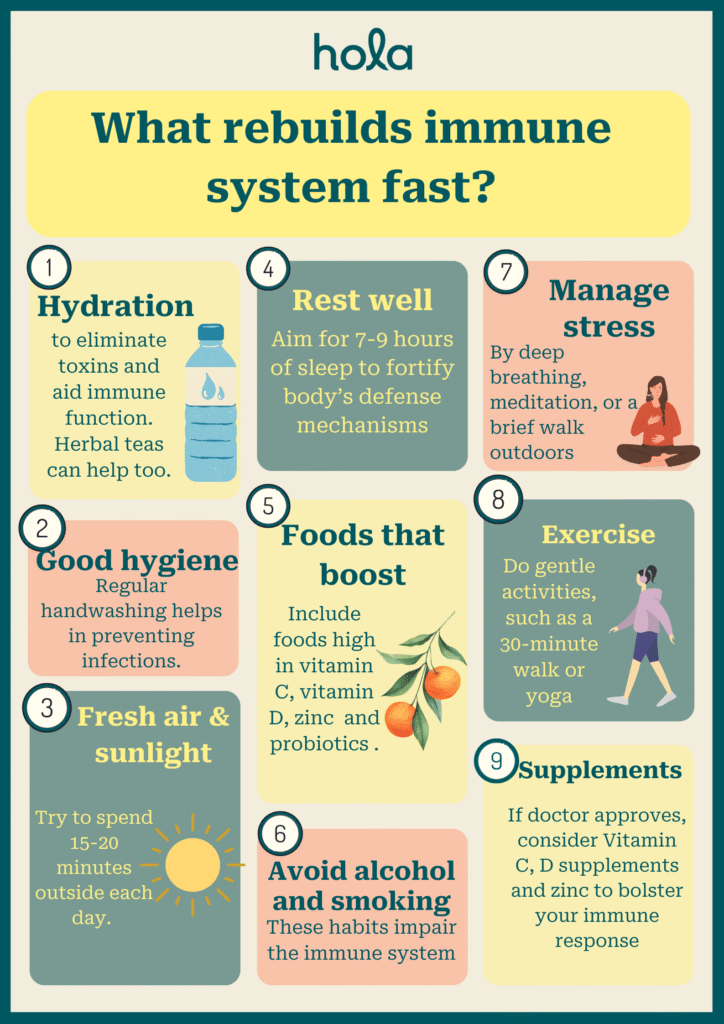Weak immune system: Symptoms & GP approved tips
Written by the editorial staff writer at Hola. Medically Reviewed by Dr. Ammar AL-ANI, MBChB, CCBST, AMC.

Contents

Summary: A compromised immune system can increase susceptibility to infections, hinder recovery, and lead to persistent fatigue. Factors such as poor diet, stress, and medical issues can contribute to this condition. Identifying the symptoms, adopting healthier lifestyle choices, and recognising when to seek medical assistance are essential for enhancing immune function.
Think of your immune system as your body’s defence force, always ready to protect against harmful invaders like viruses and bacteria. When it’s strong, it functions as a high-level security system, protecting your well-being. But when it’s weak, the defences weaken, leaving you vulnerable to illness. Recognising the signs of a weakened immune system and knowing how to strengthen it can help you stay healthier and more resilient to everyday health challenges.
Symptoms of a weakened immune system
A weakened immune system may manifest in different forms. Common symptoms include:- Frequent infections like colds, flu or other infections
- Constant tiredness or fatigue
- Delayed growth and development
- Slow healing of cuts, bruises, or wounds
- Recurrent skin problems like rashes and skin infections
- Digestive issues like bloating, diarrhoea, or constipation
- Poor appetite or unexplained weight loss
- Chronic inflammation
- Chronic stress: Prolonged stress causes the release of cortisol, a hormone that can suppress the immune system’s ability to function effectively.
- Inadequate nutrition: A deficiency in vital nutrients like vitamins A, C, D, B12, and zinc can hinder immune performance. Diets high in processed foods and low in fresh produce may also compromise immunity.
- Lack of sleep: Inadequate rest disrupts the production of cytokines, essential for fighting infections, raising the risk of illness.
- Age: As people age, their immune system weakens, increasing susceptibility to infections and illnesses.
- Lack of physical activity: A lifestyle with minimal physical activity may result in poor blood flow and impair immune system efficiency.
- Chronic diseases: Conditions like diabetes, heart disease, and autoimmune disorders can compromise the immune system, reducing the body’s ability to fight infections.
- Alcohol and tobacco use: Excessive alcohol use and smoking can harm the immune system, weaken the body's defence against infections, and elevate inflammation.
Risk factors and complications
A compromised immune system can increase your susceptibility to illnesses and various health concerns. Some factors that may weaken your immune system include:- Chronic diseases (such as diabetes, cancer, or HIV/AIDS)
- Inadequate nutrition (deficiencies in vitamins like C, D, and zinc)
- Insufficient sleep
- Elevated stress levels
- Lack of physical activity
- Smoking, alcohol consumption, or drug abuse
- Specific medications (such as steroids, chemotherapy drugs, and immunosuppressants)
Consequences of a weak immune system
- Increased frequency of infections: You might experience colds, flu, pneumonia, and other bacterial or viral illnesses more regularly.
- Delayed healing of wounds: Injuries, cuts, and burns may take longer to mend.
- Gastrointestinal problems: Higher chances of gut infections, diarrhoea, or bowel inflammation.
- Autoimmune conditions: The immune system might erroneously attack healthy cells, resulting in disorders like lupus or rheumatoid arthritis.
- Chronic tiredness: Ongoing fatigue and weakness as your body battles infections.
Feeling sick and unsure why? Speak with a GP online in 15 minutes.
How to check if the immune system is weak?
You can identify a weak immune system by recognising signs and symptoms or through medical examinations. Indicators of a weak immune system include:- Increased infections: You tend to get colds, flu, or other illnesses more frequently than normal.
- Delayed injury recovery: Wounds, bruises, and infections take longer time to heal.
- Persistent fatigue: You feel exhausted even after sufficient rest.
- Digestive concerns: Recurring diarrhoea, bloating, or conditions like foodborne infections.
- Heightened allergies or sensitivities: More significant reactions to dust, pollen, or specific foods.
- Autoimmune symptoms: Joint discomfort, skin rashes, or unexplained inflammation.
- Blood examinations (FBC): To evaluate white blood cell count.
- Immunoglobulin assessments: To measure antibody levels.
- Nutrient and vitamin assessments: To identify deficiencies (e.g., Vitamin D, zinc).
Can you rebuild your immune system?
Indeed, you can enhance and fortify your immune system by adopting healthier lifestyle habits. A robust immune system aids in combating infections and maintaining overall health.- Consume a nutrient-dense diet: Incorporate fruits, vegetables, lean proteins, and healthy fats. Foods rich in vitamin C (like citrus fruits), vitamin D (such as sunlight and fish), and zinc (found in nuts, seeds, and legumes) support immune function.
- Ensure adequate sleep: Strive for 7-9 hours of quality rest each night to enable your body to recuperate and restore immune efficiency.
- Control stress: Long-term stress can harm your immunity. To lower stress, use relaxation methods like meditation, deep breathing exercises, and yoga.
- Engage in regular exercise: Moderate activities (like walking, cycling, or yoga) enhance circulation and your immune response.
- Stay hydrated: Consuming enough fluids helps eliminate toxins and maintain immune cell functionality.
- Restrict alcohol use and discontinue smoking: Excessive drinking and smoking impair immune health and raise infection risks.
- Supports gut health: A healthy digestive system bolsters immunity. Include probiotic-rich foods like yoghurt, kimchi, and other fermented items to benefit gut flora.
- Seek sunlight and fresh air: Exposure to the sun boosts vitamin D levels, which are vital for immune health.
- Consult a healthcare professional: If you experience frequent infections or feel fatigued, a healthcare provider can assist with tests and tailored recommendations.
What boosts the immune system fast?
To quickly enhance your immune system, concentrate on a mix of healthy practices that promote immune strength. Although there isn’t an instant fix, these strategies can bolster your body’s defences in a brief period:- Stay hydrated: Ensure you drink ample water to eliminate toxins and aid immune function. Herbal teas such as ginger or green tea can be beneficial, too.
- Get adequate rest: Aim for 7-9 hours of sleep to enable your body to recuperate and fortify its defence mechanisms.
- Consume immune-enhancing foods: Include foods high in vitamin C (oranges, bell peppers), vitamin D (eggs, fish), zinc (nuts, seeds), and probiotics (yoghurt, kimchi, sauerkraut) to support immune health.
- Consider immune-supporting supplements: If you have deficiencies, supplements of vitamin C, vitamin D, and zinc can bolster your immune response. Always consult a doctor before starting any supplementation.
- Manage stress levels: Elevated stress can compromise immunity. Engage in deep breathing, meditation, or a brief walk outdoors to reduce stress.
- Exercise moderately: Gentle activities, such as a 30-minute walk or yoga, enhance circulation and immune cell function. Avoid pushing yourself too hard, as vigorous exercise can temporarily diminish immunity.
- Get fresh air and sunlight: Exposure to sunlight boosts vitamin D levels, which are essential for maintaining a healthy immune system. Try to spend 15-20 minutes outside each day.
- Avoid alcohol and smoking: These habits impair the immune system, leaving you more vulnerable to infections.
- Practice good hygiene: Regular handwashing helps prevent the spread of infections.

When to call a doctor
Contact a doctor if you encounter frequent or serious infections, as this may signal an underperforming immune system. Symptoms to observe include recurrent colds, flu, or infections that take longer to resolve, extreme fatigue not alleviated by rest, slow recovery from wounds, recurring skin issues, ongoing digestive troubles such as diarrhoea or bloating, or unexplained weight changes. If unsure about your symptoms, consider consulting a doctor online for prompt advice. They can suggest tests or treatments to enhance your immune health.What questions should I ask my doctor?
When discussing your immune system health with a doctor, asking the right questions can provide valuable insights. Here are some essential inquiries you might have:- Do I have an impaired immune system? How can I determine this?
- What assessments should I undergo to evaluate my immune function?
- Are there specific medical conditions or medications impacting my immunity?
- What lifestyle modifications can help reinforce my immune system?
- Should I consider taking supplements like vitamin C, vitamin D, or zinc?
- How can I avoid frequent colds, flu, or other illnesses?
- What vaccinations should I contemplate for improved immunity?
- When is it appropriate to seek medical assistance for recurrent infections or fatigue?
Telehealth with an online doctor
Telehealth appointments enable people to connect with healthcare professionals concerning immune health issues from the ease of their homes. Hola Health's telehealth platform offers a convenient and trustworthy way to evaluate and enhance immune function. Our services are accessible around the clock and include:- Telehealth consultations: Individuals can connect with doctors to talk about frequent illnesses, tiredness, slow healing of wounds, or other immune-related issues. The GP will assess symptoms and provide expert guidance on how to boost immunity.
- Instant scripts online: If deemed necessary, healthcare providers can electronically issue prescriptions for supplements such as vitamin D, zinc, or medications for treating infections. Patients can pick these up at local pharmacies or choose same-day delivery.
- Doctor referrals: For ongoing immune-related problems, like recurring illnesses or autoimmune disorders, doctors can suggest patients for diagnostic assessments or specialist referrals, such as immunologists.
- Online medical certificates: If symptoms related to immunity warrant time off or leave from work, Hola Health’s telehealth service can provide same-day or multi-day medical certificates tailored to individual requirements.
Prevention tips
Keeping a robust immune system is vital for warding off infections and illnesses. Here are essential tips to maintain a strong immune system:- Consume nutritious foods: Prioritise fruits, vegetables, lean proteins, and healthy fats.
- Stay well-hydrated: Ensure adequate water intake to support immune performance.
- Ensure sufficient sleep: Strive for 7-9 hours of sleep each night.
- Exercise consistently: Engage in moderate activities like walking or yoga.
- Control stress: Utilise meditation, deep breathing, or relaxation techniques.
- Practice hygiene: Wash hands regularly and maintain cleanliness in surroundings.
- Limit alcohol and quit smoking: Decrease alcohol consumption to prevent undermining immunity.
- Get regular sunlight exposure: Enhance vitamin D levels with daily outdoor activity.
- Stay informed about vaccinations: Safeguard against preventable diseases.
What we treat
- Cough
- Nausea & vomiting
- Fever
- Hayfever
- Fatigue
- Sore throat
- Acne
- Hair loss
- Gout
- Eczema
- Rosacea
- Sunburn
- UTI
- Erectile dysfunction
- Contraception
- Morning sickness
- Morning after pill
- Prostate health
- Anxiety
- Depression
- Stress
- Grief & loss
- Antidepressants
- Premature ejaculation
- Asthma
- Blood pressure
- Blood thinners
- Diabetes
- Cholesterol
- Migraines & headaches
- Allergies
- Body ache
- Heartburn & reflux
- Sleep disorder
- Pain relief
- Gastro
Related Articles
Disclaimer
This blog is for general informational purposes only and does not indicate that Hola Health provides all treatments or preventive measures mentioned. It is not intended to be a substitute for professional medical advice. Always seek the guidance of your doctor or other qualified health professional with any questions you may have regarding your health or a medical condition. For emergencies please immediately contact 000. Any medical topics discussed are intended to educate, not to imply availability through Hola Health.

Get affordable healthcare on your terms, with quick access to qualified, Australian-registered telehealth doctors & health practitioners, 24/7, 365 days a year. No more searching for ‘doctors near me‘ – Hola connects you instantly.
Address: 79 St Georges Terrace, Perth WA 6000


Hola Health App
Get affordable healthcare on your terms, with quick access to qualified, Australian-registered telehealth doctors & health practitioners, 24/7, 365 days a year. No more searching for ‘doctors near me‘ – Hola connects you instantly.
Call 000 for emergency or urgent medical help.
Address: 79 St Georges Terrace, Perth WA 6000
© Hola Health, a brand of Packapill Pvt Ltd


 Facebook
Facebook  X
X  Copy Link
Copy Link











